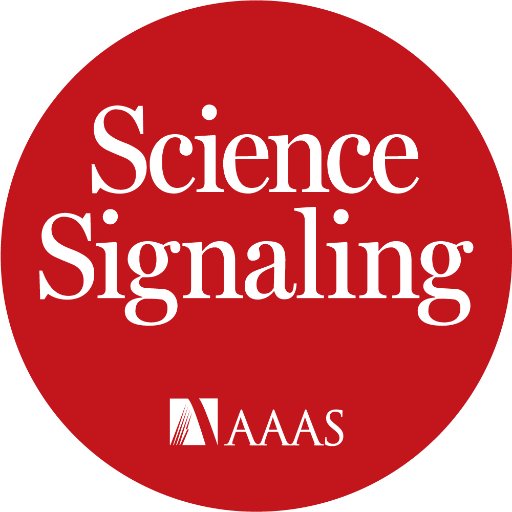
Science Signaling
@scisignal
Followers
20K
Following
739
Media
4K
Statuses
5K
Uncovering mechanisms in biology, gaining insights into physiology and disease.
Washington, DC
Joined April 2010
A new study of LAIR-1–expressing macrophages could inform future immunotherapeutic strategies, scientists trace how pathways connecting dopamine receptors and calcium channels support spatial working memory in mice, and more this week in #ScienceSignaling. https://t.co/ADiRh4mQik
0
1
33
This week in Editors’ Choice, we highlight a study by Lauriola and colleagues in @MolecularCell, showing that a calcium-dependent E3 ligase mediates NF-kB activation in intestinal cells. Read a summary: https://t.co/6XazBogU5s
0
0
0
Activation of D1/5 dopamine receptors supports spatial memory in mice by inducing the phosphorylation of a calcium channel subunit by the kinase PKA, according to new findings. @MPFNeuro
https://t.co/WpD7wCxGNs
0
1
1
New findings suggest that therapies that increase the expression of the scavenger receptor MARCO on LAIR-1–expressing tumor-associated #macrophages could boost an anti-tumor response by preventing inhibitory signaling. @CTI_UMCUtrecht
https://t.co/eHslunSw6Z
0
0
4
A study reveals functionally different mutations in a #Gprotein associated with a rare neurodevelopmental disorder, showing the potential contribution of each variant—and any potential therapeutic intervention—must be examined individually. @karolinskainst
https://t.co/MQTHVfpqen
0
0
1
The experience focuses on emotion rather than action. Progress comes from observing subtle shifts rather than completing traditional objectives.
0
0
11
A new study sheds light on how a cell-cycle kinase inhibitor may be used most effectively to treat #OvarianCancer and hints that the protein p16 could be a useful marker for identifying those patients most likely to benefit. @CUBoulder
https://t.co/6W7dBOQPTm
0
0
2
New research involving cells, spheroids, and mice suggests that drugs that inhibit a protein named SOS1 could enhance the staying power and efficacy of the frontline therapy #osimertinib for some patients with non-small cell #LungCancer. @USUhealthsci
https://t.co/9gv4dMVX1w
0
1
3
New research visualizes how plant cells generate different patterns of calcium ion waves to respond to microbes and wounds, helping to answer how plants can generate a diverse array of responses through this elementary signaling mechanism. @PurdueBPP
https://t.co/ifQXCO5qKk
0
0
2
Using structural models, researchers identify several #GNAISyndrome-linked variants in G-alpha-i1 that could be causing disease and trace how each mutation has unpredictable effects on protein and pathway function. @karolinskainst
https://t.co/MQTHVfpqen
0
0
2
MAMPs such as the bacterial peptide flg22 generate patterns of calcium ion waves in #Arabidopsis that are distinct from the response to mechanical wounds, shows a new study combining high-resolution live imaging with computational modeling. @PurdueBPP
https://t.co/ifQXCO5qKk
0
0
2
Don’t miss the new issue of #ScienceSignaling! Patterns of calcium ions reveal how plants defend themselves against microbes and injuries, researchers decrypt how mutations affect a G protein associated with a rare neurodevelopmental syndrome, and more. https://t.co/jD5JOAzYDd
1
3
26
A new study sheds light on how a cell-cycle kinase inhibitor may be used most effectively to treat #OvarianCancer and hints that the protein p16 could be a useful marker for identifying those patients most likely to benefit. @CUBoulder
https://t.co/6W7dBOQPTm
0
0
3
A recent study reveals how #SalivaryGlands respond and regenerate after they are damaged by radiation from proton or photon therapies, which could guide future efforts to promote salivary gland recovery after irradiation. @coppesrp @umcg
https://t.co/z8u8Jvr0CK
0
0
1
A structure-based platform reveals new insights about the human SH2 domain and could be applied to many protein domains of interest to interrogate their binding interfaces and molecular interactions. @UVABME #Biochemistry
https://t.co/r2R12Uu1yE
0
0
0
This week in Editors’ Choice, we highlight a study by Tai and colleagues in @Cell_Metabolism, showing that hair follicle stem cells are activated after skin injury by adipocyte-derived fatty acids. Read a summary: https://t.co/hQilnc5enZ
0
0
1
New research involving cells, spheroids, and mice suggests that drugs that inhibit a protein named SOS1 could enhance the staying power and efficacy of the frontline therapy #osimertinib for some patients with non-small cell #LungCancer. @USUhealthsci
https://t.co/9gv4dMVX1w
0
0
1
How do #OvarianCancer cells resist CDK2 inhibitors? Scientists reveal mechanisms of compensatory CDK signaling and find that cancer cells enriched in p16 display less CDK4/6 activity and are more sensitive to treatment. @CUBoulder
https://t.co/6W7dBOQPTm
0
0
0
Targeting the signaling molecule SOS1 slows the emergence of resistance to #osimertinib in EGFR-mutant #NSCLC cells by disrupting backup effector pathways, suggesting SOS1 inhibitors could augment the efficacy of RTK/RAS-targeted therapies. @USUhealthsci
https://t.co/9gv4dMVX1w
0
0
2
Preclinical work reveals a target to slow resistance to an EGFR inhibitor in lung cancer, new findings about CDK2 inhibitors could lead to more personalized ovarian cancer treatments, and more this week in #ScienceSignaling. https://t.co/DbzssoHvT0
1
4
25
A structure-based platform reveals new insights about the human SH2 domain and could be applied to many protein domains of interest to interrogate their binding interfaces and molecular interactions. @UVABME #Biochemistry
https://t.co/r2R12Uu1yE
0
0
3


